University of Helsinki
Center for Activity Theory and Developmental Work Research
Original version at http://home.edu.helsinki.fi/~jsilvone/Oekonux/OekoN03_JS.html
General ideas: contradiction, history, and every day practices
Three aspects
- Economic aspect: Free software vs. proprietary software.
- Community aspect: Open, decentralized, global Bazaar, a virtual community vs. Hierarchical Cathedral
- Innovation aspect: New development model restructuring the developer-end-user relation.
Technical and Social in Linux?
| A Code / Program | A License |
| UNIX like operating system | GPL licensed free / open source software |
| invented by Linus Torvalds in 1991 | FSF founded in 1984 by Richard Stallman. |
| Mode of development | Mode of production |
How do they relate?
Dimensions of `free' and `open'
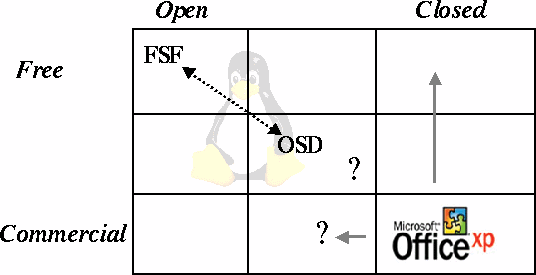
Radical localism
Fundamental societal contradictions of the given socio-economic formation are present in local activity of that society. Impersonal societal structures can be seen as consisting of local activities carried out by concrete human beings with the help of mediating artefacts. Look at society more as a multi-layered network of interconnected activity systems and less as pyramid of rigid structures dependent on a single centre of power.
(Engeström 1999, 36)
Expansion of the `Linux Community'
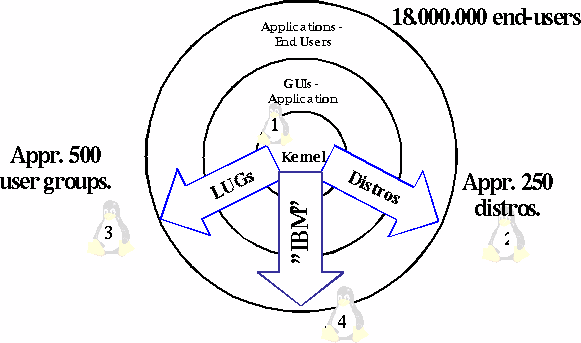
Linux kernel hackers
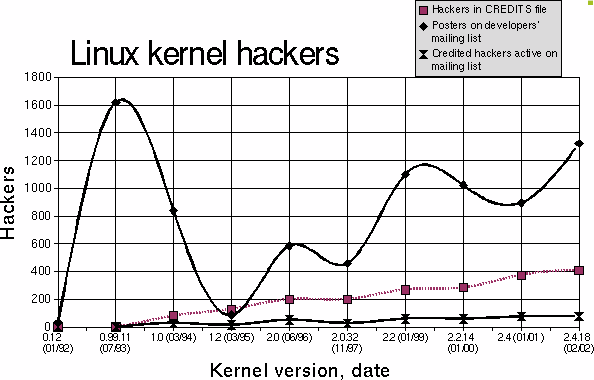
Kernel developers in Credits files
| CODES | 1 | 2 | 3 | 4 | 5 | 6 | 7 | 8 | Totals |
| *SUB Africa | 0 | 0 | 0 | 0 | 0 | 0 | 1 | 1 | 2 |
| *SUB Asia | 3 | 8 | 13 | 13 | 18 | 18 | 23 | 20 | 116 |
| *SUB Europa | 38 | 58 | 92 | 97 | 135 | 144 | 175 | 191 | 930 |
| *SUB North America | 33 | 51 | 69 | 73 | 90 | 93 | 126 | 137 | 672 |
| *SUB South America | 0 | 0 | 2 | 2 | 3 | 4 | 8 | 12 | 31 |
| Totals | 74 | 117 | 176 | 185 | 246 | 259 | 333 | 361 | 1751 |
Distributions
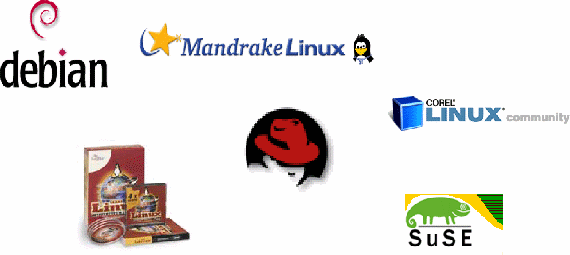
Linux User Groups
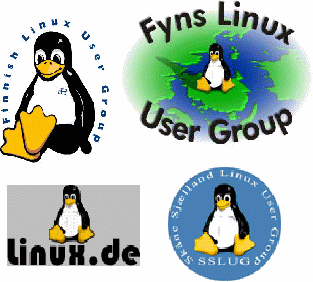
495 user groups in 69 countries http://lugww.counter.li.org/ (August 2002).
(August 2002).
LUGs by Continent (members)
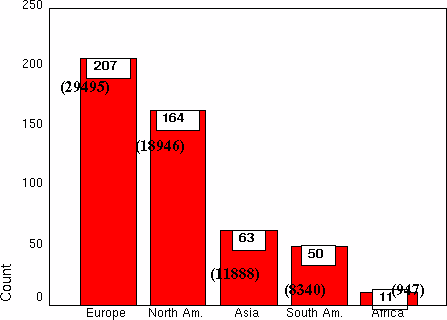
In total:
- 495 LUGs
- 69616 individual members
LUGs by Language
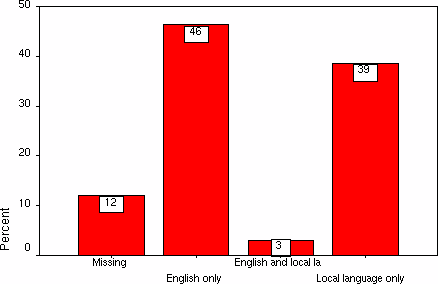
LUG inside the Community
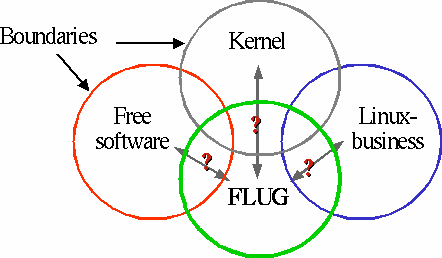
The `Community'?
- Communities are networks of interpersonal ties that provide sociability, support, information, a sense of belonging, and social identity. (Wellman 2001, 1)
- Transition from strong ties to weak ties
- Networks instead of traditional communities and/or hierarchies
The case: Finnish Linux User Group
FLUG - Finnish Linux User Group
- In 1997, an informal group; in 1999 first Install Fest; in 2000, formal nationwide association. Appr. 250 formal members, 99 % male.
- Main activity: flug-l e-mail list - about 1800 subscribers, 289 active participants (9 hotmail users).
- Regular meetings, annual LDD.
- `Linux Goes Schools' campaign + local groups.
flug-l
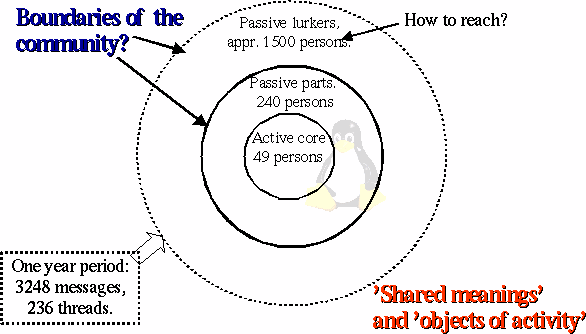
Steps in analysis
- Classification of all messages by four main topics
- Identifying 236 individual threads
- Identifying the main groups of discussion participants.
- `Thick description' of discussions peaks.
Discussion topics by month
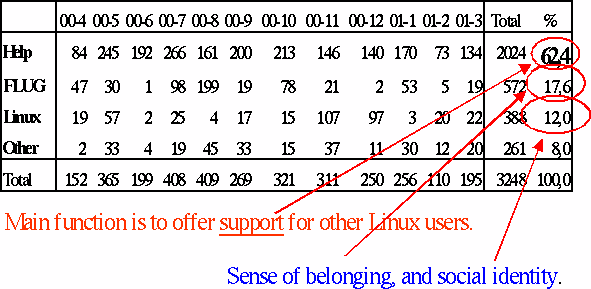
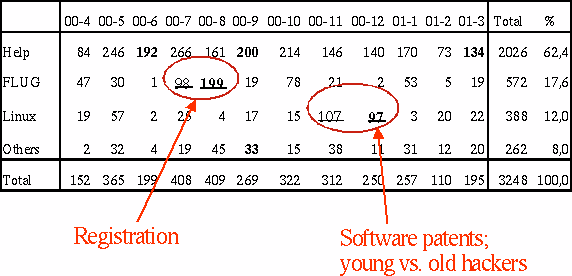
Young hackers vs. old gentlemen
- Linux-portal thread: 97 mails, 34 participants, 13 days.
- `Adjacency pairs' = 51. `Nodes' = 8. Subjects = 7. `free flouting mails' = 2.
- Opening: recommendation to visit a Finnish Linux portal. Thread transforms to a dispute about the nature of programming Linux.
Opening (ap1)
P2486 + *Date*: Sat, 9 Dec 2000 22:16:53
Has anybody noticed the portal http://www.linuxonly.cx/ , it seems to be quite promising. I recommend everybody to visit.
, it seems to be quite promising. I recommend everybody to visit.
P2487 + *Date*: Sun, 10 Dec 2000 18:07:45
I have been there and even sometimes produced a few pieces of news but the site is so amateurish and the language skills of the editor is so weak that it does not impress as a portal.
Young Hackers (ap 3)
P2493 + *Date*: Mon, 11 Dec 2000 11:51:39
Tell me, old gentlemen, is Linux itself created by profs or by amateurs? So many times have we noticed how much better the programs written by amateurs are, compared with proprietary ones. So, a little bit amateurship should be accepted, at least in our circles.
P2522 + *Date*: Tue, 12 Dec 2000 14:38:35
In these circles only so called amateurs are professionals, and professionals are bunglers. You can't learn these things at school, at all.
Old gentlemen
P2533 + *Date*: Wed, 13 Dec 2000 12:56:18
> I'm 17 (---) and I have to go to imho totally futile high
> school.
Don't dress yourself in the sack. High school math and physics are a real good base for programming.
P2534 + *Date*: Wed, 13 Dec 2000 13:03:09
> I'm 17 (---) and I have to go to imho totally futile high
> school.
High school is for general education. Coding of a program is not separated from the real life. On the contrary.
Tensions in the thread
| Amateur | vs. | professional |
| Skilled | vs. | wage labour |
| Young | vs. | old |
| Open | vs. | closed |
| Freedom | vs. | control |
| Self-learning | vs. | formal education |
Discussion themes by subgroup
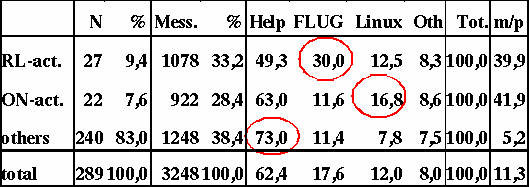
Local practices
- Linux Demo Days (2000, 2001
 , 2001
, 2001 , 2002)
, 2002)
- Monthly meetings ("miitti")
- Excursions to Valamo (and other places)
- Linux Goes School
- User Meetings
Ulvila Install Fest 1999
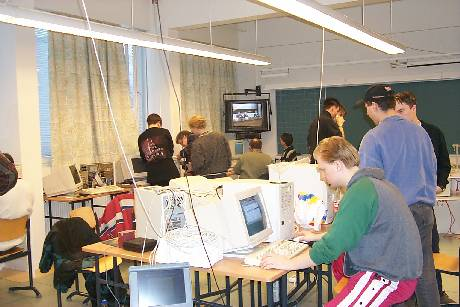
Otaniemi 1999
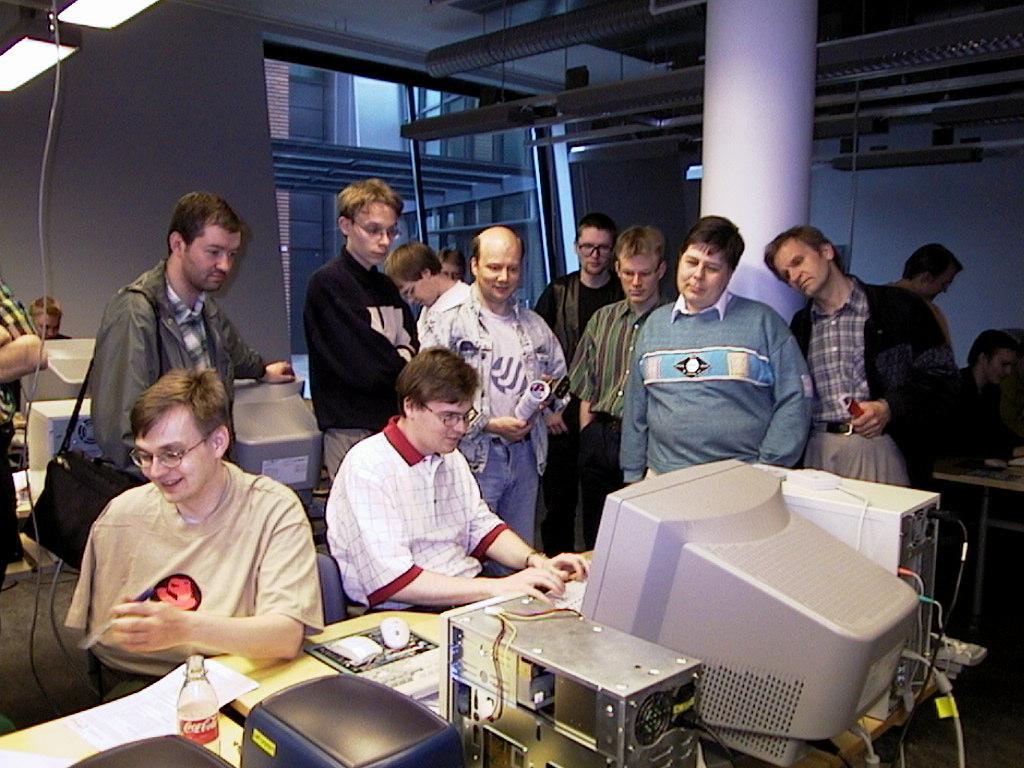
LDD at "Vanha" 1999
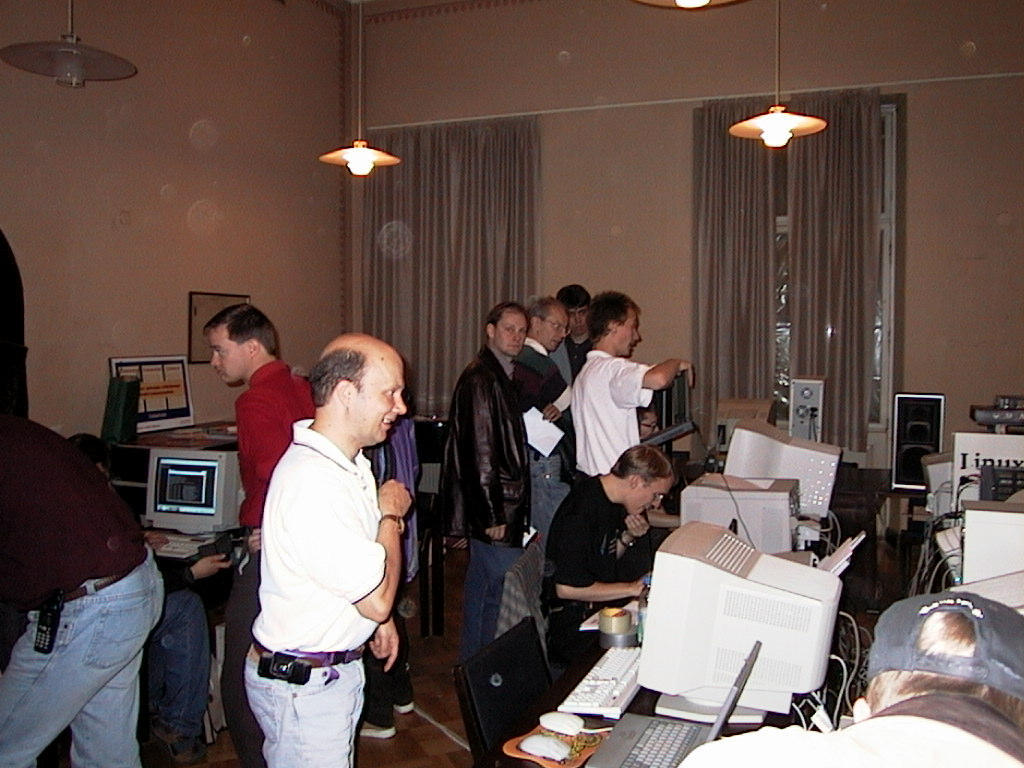
LDD 2001 in Lahti
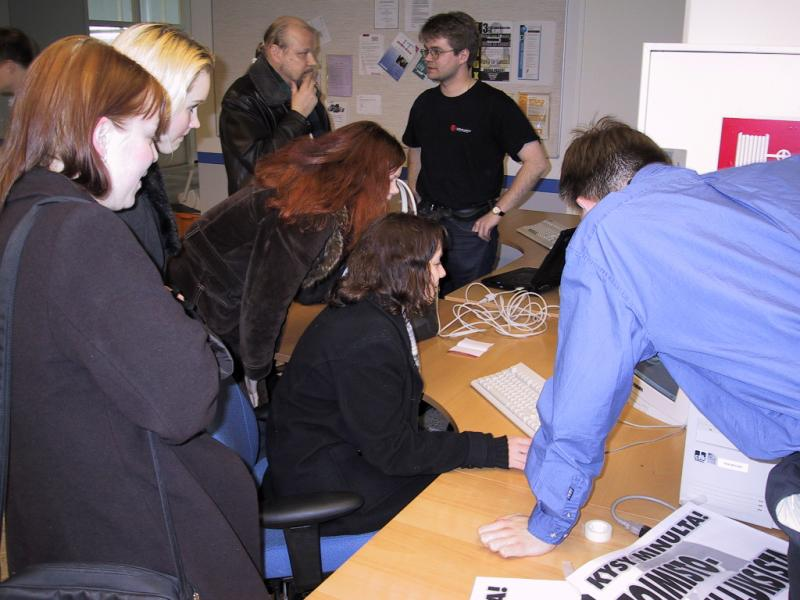
FLUG
- FLUG is a community of active and highly skilled Linux users (educational function)
- FLUG as a Finnish-language organization is closely connected with the global www-networks (translation function)
- FLUG has a moderate political profile (Linux instead of GNU/Linux) being active in such cases as software patenting
- FLUG hosts on-line and real-life activists as well as radical and moderate hackers. The meaning of `Linux' is being constructed in continuous debates between these groups
Some functions of FLUG
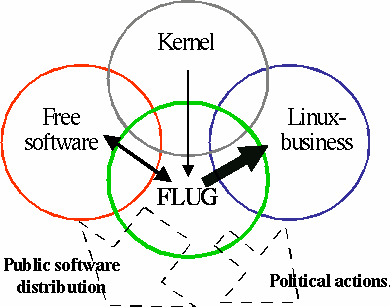
Some conclusions
- The `Linux community' is a complicated network of different communities. They are 'virtual' and they are anchored in local social activities.
- Linux user groups are an essential part of the whole network making Linux possible. They are `translators' between developers and lead users, offering an arena for local articulations of `Linux'.
- Linux communities are not simply `open' and `decentralized'. They have their own hierarchies, and divisions of work. Communities are led by rather small group of activists.

 |
|